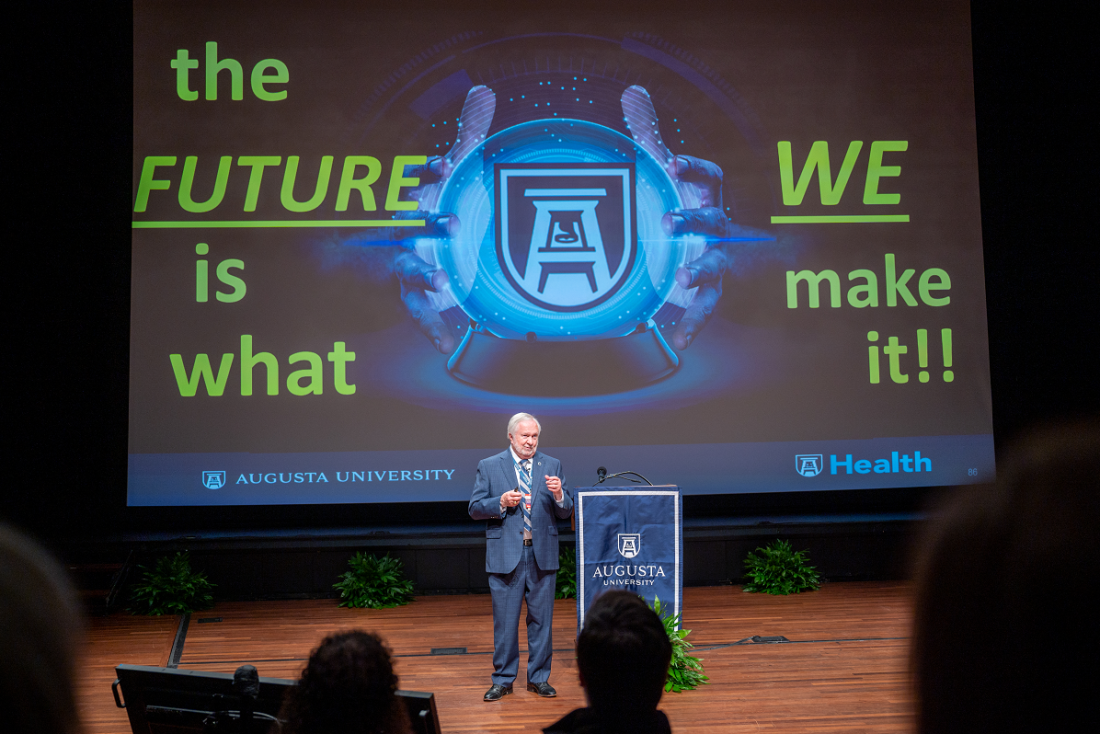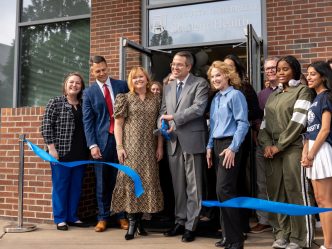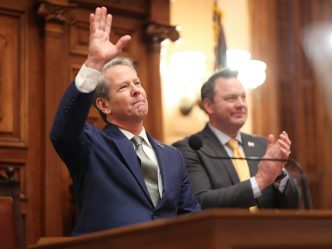In his annual State of the University address, President Brooks A. Keel, PhD, discussed many outstanding accomplishments in the past year while also addressing the future and how Augusta University can reach its aspirational imperatives, which include 16,000 students by 2030, a top 60 NIH ranking by 2030 and the Carnegie Community Engagement Classification by 2026.
During his address, Keel mentioned new administrators, including Ryan Erlacher, director of athletics, and Teresa Waters, inaugural dean of the School of Public Health.
He also discussed the state budget that included $105 million to implement a new electronic medical records system at the Medical College of Georgia at Augusta University.
“This is going to completely transform not only the way we’re going to treat patients, but the way we train students in the future to treat patients. They’re now going to have the opportunity to learn on an up-to-date, state-of-the art electronic medical system. That is the heart and soul of the business of a hospital,” said Keel.
Keel touched on how the state of Georgia cut the University System of Georgia’s budget by $66 million. He indicated over $10 million of the cuts will affect Augusta University, but the good news is, due to increased enrollment, nearly $9 million of that will be covered, leaving a hole of about $1.4 million.
Steps are being taken to address the shortfall and Keel expressed gratitude to employees for positioning AU to absorb the cuts. He’s also optimistic about the possibility of the budget being restored in January, thanks to efforts by USG Chancellor Sonny Perdue and Gov. Brian Kemp.
Augusta University remains one of the few USG institutions that continues to see enrollment growth. As a matter of fact, AU has grown by 18% since 2015, totaling 9,800 students in fall 2023.
“We have to be innovative in everything that we do. Yes, we have to teach the core curriculum courses, but we have to be innovative in programming as we move ahead, and that’s going to help us stand out from the pack.”
President Brooks A. Keel
“That, folks, is truly phenomenal,” said Keel. “It says so much about the great work you do, but it speaks even louder about the reputation of this institution.”
He added retention of those students is of the utmost importance, as well. Many students aren’t able to finish their final year of school because they lack a couple of hundred dollars to pay their tuition.
“We can’t let that happen. Once those students drop out, it’s incredibly difficult for them to come back. Needs-based scholarships are going to allow us to fill that gap to keep those students here so they can graduate and go be productive members of society,” Keel said.
He also highlighted several new academic programs that have been approved. A Bachelor of Science in Biomedical Systems Engineering will see the first class starting in fall 2023, along with the Bachelor of Science in Neuroscience and Bachelor of Arts in Sports Management. A Master of Health Sciences in Speech-Language Pathology will begin in fall 2025.
He also emphasized the expansion of the animation program and how it’s not “your mama’s idea of what Disney World is.” It’s where art meets tech, and that’s what will make Augusta University’s program particularly special, he said.
Augusta University Online has also been rolled out with three current degrees and 25 more planned for the next five years.
“This is also going to help us do something unique and meet the needs of students in a very unique way. I can’t wait to see the way this is going to go,” added Keel.
With higher education facing a pending enrollment cliff across the country, Keel reiterated the fact that Augusta University needs to stand out from the pack. One way is through innovation, a theme that runs through all of the university’s strategic priorities.
“We have to be innovative in everything that we do. Yes, we have to teach the core curriculum courses, but we have to be innovative in programming as we move ahead, and that’s going to help us stand out from the pack.”
 Augusta University
Augusta University




